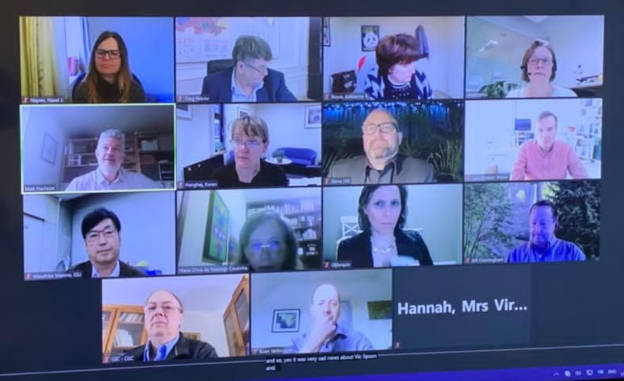On November 17, 2020, a meeting of the Strategic Steering Committee (OSSC) of the OneGeology International Consortium was held as a videoconference.
The meeting was attended by representatives of the geological surveys of Canada, England, USA, Russia, France, Japan, Ireland, Sweden, Brazil and Australia. This is the second meeting of the Strategic Committee, the first was held in Uppsala (Sweden) in March 2019.

The meeting discussed a wide range of issues related to the management of the consortium, the powers of the chairman of the Strategic Committee, the composition and amount of data to be hosted on OneGeology, the interest of global geological surveys in the publication of geological maps on the OneGeology portal using the GeoSciML standard (specification of the Open Geospatial Consortium (OGC) for the interchange of geological data), the state of projects supervised by OneGeology - Digital Twins and Loop (3D modeling).
Regarding the management of the consortium, the meeting participants expressed support for a two-year extension of the term of powers of the current chairman, Thirza van Daalen (Director of the Geological Survey of the Netherlands).
The meeting participants noted that OneGeology have actually become a place where representatives of geological surveys had the opportunity to discuss problems of effective interchange of digital geoscience information and use OneGeology technologies when creating national geoscience portals.
During the meeting, Koen Verbruggen (Director, Geological Survey of Ireland) said that at this stage, collaboration and exchange of information rather than building physical infrastructure which requires effort to raise funds, was very important. Eurogeosurveys have a new direction with a lot of funding for geological mapping and modeling in Digital Twins technologies with a focus on climate, oceans and seabed mapping. Geological Digital Twins, including urban infrastructure, will be of interest to a wide range of geological communities.
Steve Hill (Chief Scientist, GeoScience Australia) said that all geological maps produced by the Geological Survey of Australia included the specification for an exchange standard for geological information, GeoSciML.
Tirza van Daalen (Director, Geological Survey of Netherlands - Chair of OSSC) noted that the European Commission was to launch a new framework programme that included subsurface digital twins of Europe. The development will start with the marine environment and build on existing successful initiatives such as EMODnet. It is likely that there will be a digital twin of Europe in the next 10 years and OneGeology should be ready to collaborate. The need to take steps to move from the local scale to a national and global scale was also discussed. To do this, it would be necessary to answer a number of questions, in particular, what the global picture will look like, how digital twins can communicate with each other on a global scale, etc. And in this case, interoperability and common standards will be key.
Karen Hanghøj (Executive Director, British Geological Survey) said there were many initiatives looking at digital twins at various scales. For example, the Geo8 European Alliance for Earth Sciences is discussing development of a European-scale digital twin. Any OneGeology activities would needs to synergise with such initiatives. It is also important to discuss the strategy for digital twins to ensure all efforts are truly synergised.
Mashiko Makino (Assistant Director General, Geological Survey of Japan) said their Survey were developing a 3D geological model of central Tokyo. The model includes physical properties of sediments where softer sediments can enhance earthquake motion. The digital twin shows the relationship between the geology and earthquake ground motion.
The meeting also discussed the topic of a software platform for digital twins. In particular, the question was discussed whether digital twins/3D models should be hosed on OneGeology. OneGeology can support the exchange of digital twins - this will be a big step towards the creation and use of global digital twins.
The meeting decided to hold technical workshops early next year and to report on the results at the next OSSC meeting, which will be focused on digital twins, to be held at the end of March 2021. It was suggested that experts from other organizations working on the topic of digital twins to be invited and that it was necessary to prepare for the discussion of the OneGeology readiness to the digital twins initiative in terms of standardization.
Matt Harrison (Director Data Services & Infrastructure, BRGM) agreed to rework the digital twin information and present it as a flyer to make OneGeology's potential role clearer for meeting attendees.